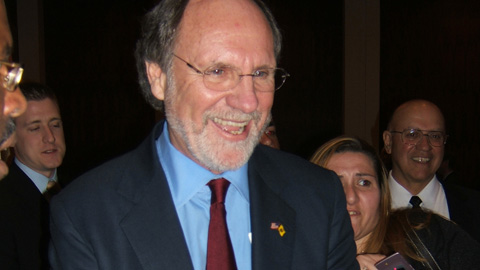Economy Watch: Drunk on Risk, MF Global Falls on Face
It was something of a shock on Monday when MF Global Holdings went belly up. The OECD asserted that the euro-zone is going to grow slowly in the future. And the Chicago ISM saw 25 months of expansion amid a drop in the three-month moving average.
November 1, 2011
By Dees Stribling, Contributing Editor
Though not in the major leagues of failure as Lehman Brothers or AIG were, it was still something of a shock on Monday when MF Global Holdings Ltd. went belly up. It seems that MF Global, the Wall Street futures specialist lately run by Jon Corzine, Goldman Sachs alum and former governor of New Jersey, decided to gamble in a big way on European sovereign debt (to the tune of around $6 billion, or 15 percent of its balance sheet). The company laughed in the face of risk, one might say, and leveraged that risk as if it were still 2006 — in some cases as much as 30-to-1 leverage.
Turns out that risk had the last laugh on MF Global. The company filed for Chapter 11 bankruptcy after unsuccessfully seeking a buyer. At about a tenth the size of Lehman Bros., however, the failure isn’t likely to cause a wider panic. But it might be an object lesson in how not to learn from a financial crisis.
Or it may be something a little more scandalous. The New York Times reported on Monday that as much as $700 million worth of MF Global’s customer’s money “went missing” recently. The SEC and the U.S. Commodities Futures Trading Commission said in a joint statement that “MF Global… reported possible deficiencies in customer futures segregated accounts held at the firm.” The agencies are taking a closer look at just what the company was doing with that wad of other people’s money.
OECD Warns of Slow European Growth
The Organisation for Economic Cooperation and Development, which is the club for the developed nations of the world, played the part of killjoy on Monday by asserting that the economies of the euro-zone are going to grow more slowly in the near future. The organization further said that European leaders need to pursue “rapid action” to follow through on the things they’ve promised to do recently so that the global economy can recover.
“Much of the current weakness is due to a generalized loss of confidence in the ability of policymakers to put in place appropriate responses,” the OECD said in a statement — that is, we suspect that the clowns at the top don’t know what they’re doing. “It is therefore imperative to act decisively to restore confidence and to implement appropriate policies to restore longer-term fiscal sustainability,” the organization added in organization-like prose that urged the euro-zone nations to get their act together.
The organization cut its growth forecast for the euro zone to 1.6 percent, down from the 2 percent it predicted five months ago. But the nations that use the euro were hardly alone in receiving lower growth estimates from the organization. The OECD also said that it thinks the United States will grow only 1.7 percent this year instead of 2.6 percent.
Chicago ISM Reports Modest Expansion
The Institute for Supply Management-Chicago said on Monday that its Business Barometer marked a 25th month of expansion, but that the three-month moving average for the barometer dropped for the seventh month in a row. Between September and October, the barometer dropped from 62.8 to 57.8.
The components of the barometer were a mixed lot. Employment was its highest in six months, but New Orders erased half of its gain in September. Inventories were down, reversing the trend in September, while Prices Paid increased only modestly.
Wall Street seemed to be unnerved by the bankruptcy of MF Global on Monday, or maybe the sobering predictions for Europe, but in any case the Dow Jones Industrial Average dropped 276.1 points, or 2.26 percent. The S&P 500 lost 2.47 percent and the Nasdaq was down 1.93 percent.








You must be logged in to post a comment.